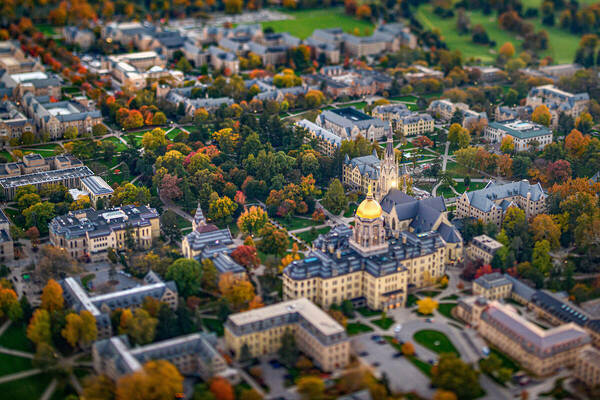
Researchers at the University of Notre Dame commit to making discoveries that not only represent achievement in a scholarly field but also seek to contribute to the greater good.
Now, thanks to a new center known as the Center for Broader Impacts (CBI), faculty will have more support than ever as they hope to expand the public reach and societal benefits of their work.
Robert J. Bernhard, vice president for research and professor of aerospace and mechanical engineering at Notre Dame said, "Broader impacts is an increasingly important criterion for many of our sponsors. But more importantly, they are fundamental to Notre Dame's mission that our research and scholarship be implemented as a force for good. Notre Dame has built an unparalleled set of opportunities and partnerships that could be used to utilize our discoveries. The new Center for Broader Impacts will be the key facilitator to unleash that potential.”
The center will develop a suite of tools and programs that will provide several pathways for researchers to engage in broader impacts work.
“We anticipate that most of the faculty who connect with the center will contact us early during the proposal development stage,” said Gina Navoa Svarovsky, an associate professor of the practice in Notre Dame’s Center for STEM Education within the Institute for Educational Initiatives.
Svarovsky, who will serve as the center’s founding faculty director, explained that many funding agencies include a broader impacts requirement for incoming grant proposals. This requirement ensures that projects receiving public funds do, in fact, provide benefits to the public.
While the National Science Foundation (NSF) and the National Institutes of Health (NIH) have been asking researchers to state the broader impacts of their research proposals for decades, other funders and foundations—including those in the social sciences, arts, and humanities—have followed suit.
Today, many institutions make funding decisions not only by assessing a project's potential to create new knowledge but also by assessing researchers’ plan for amplifying the impact of their work, potentially through communicating findings and results to a wide range of audiences or creating programs and educational experiences based on aspects of the research.
Svarovsky said she is excited for the center to build upon Notre Dame’s focus on being a force for good.
“The University has several outstanding centers, institutes, and offices that have a long history of engaging with community partners in transformative ways on the local, national, and global levels," she said. "But there hasn’t been a consistent mechanism for researchers to be able to get a sense of everything that's going on—and more specifically, how to possibly plug into an existing effort with their own research area. CBI aims to help address this challenge. We'll start by developing a deeper understanding of the broader impacts efforts already happening through the University, then increasingly provide faculty with information, options, and opportunities for collaboration.”
Svarovsky draws on a deep well of experiences when it comes to working at the intersection of research, evaluation, and broader impacts. In addition to serving for six years as the Director of Program Evaluation and Research at Notre Dame’s Institute for Educational Initiatives, Svarovsky has led several NSF-funded projects focused on engineering education, particularly for young learners from traditionally underserved communities. She has also worked to improve public engagement with research by collaborating on projects that promote STEM education, science literacy, and public trust in scientific findings.
Patricia Clark, the O’Hara Professor of Chemistry & Biochemistry and associate vice president for research at Notre Dame, noted the growing number of researchers interested in widening their impacts.
“Increasingly, we see faculty—those pursuing all kinds of research and scholarship in their labs and offices at Notre Dame—with a deep desire to connect their research interests in ways that help their local community and the world at large, to make a difference. But there’s not a one-size-fits-all solution. It’s about matching up people and projects, interests and needs, and finding a great fit,” she said.
Over the short term, the center will hire additional staff to meet the current demand for supporting faculty who are interested in incorporating broader impacts efforts within their research proposals and portfolios.
In the future, CBI also plans to host a number of ongoing signature programs that faculty can connect with, helping to alleviate some of the challenges associated with developing infrastructure from the ground up.
Current members of the Notre Dame faculty who are interested in news and updates from the Center for Broader Impacts can join CBI's Google Group by visiting https://groups.google.com/a/nd.edu/g/cbi-list/.
Contact:
Brett Beasley / Writer and Editorial Program Manager
Notre Dame Research / University of Notre Dame
bbeasle1@nd.edu / 574.631.8183
research.nd.edu / @UNDResearch
About Notre Dame Research:
The University of Notre Dame is a private research and teaching university inspired by its Catholic mission. Located in South Bend, Indiana, its researchers are advancing human understanding through research, scholarship, education, and creative endeavor in order to be a repository for knowledge and a powerful means for doing good in the world. For more information, please see research.nd.edu or @UNDResearch.